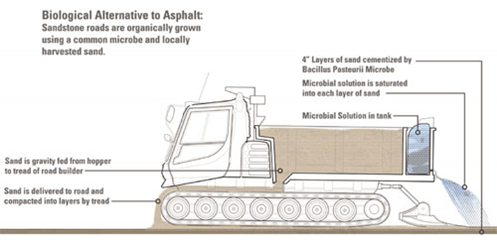Despite its widespread use for roads, asphalt presents significant problems related to the environment (due to the use of bitumen compounds), sustainability (due to the use of oil) and its variable price, which makes it necessary to consider at least new materials for road construction. It is possible that the future of more sustainable and economical road construction lies in a bacterium called Bacillus Pasteurii, which combined with sand produces solid sandstone very quickly, forming a ready-to-use pavement.
The construction of this type of road would be a much quicker, cheaper and more efficient way, and its use would be ideal both for areas of the Third World (where there are no roads in many places, and this would greatly simplify their use), and for many places which need new roads.
Furthermore, this new material has the advantage of increasing visibility on roads, and causing a decrease in temperature in large cities, unlike traditional asphalt.
Although there is still time to determine the real viability of this project, and concrete use in high traffic environments, the idea is certainly worth further development because these new materials may be very common in the future.

